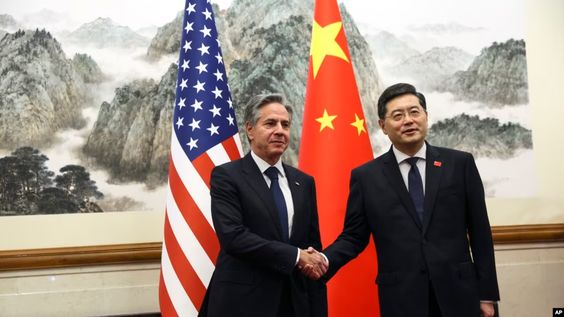Headlines
Blinken Launches Discussions With Chinese Counterparts in Beijing

State Department official Antony Blinken is in Beijing. Since 2018, he is the first senior American diplomat to go to China. Blinken will meet with top Chinese diplomat Wang Yi, Chinese Foreign Minister Qin Gang, and most likely Chinese President Xi Jinping.
Officials from the United States and China agree that senior-level channels are necessary to stabilize the bilateral relationship.
However, there is little hope that the two nations can mend their contentious relations with Taiwan, technology, other security concerns, and human rights.
Blinken stated at a news conference in Washington on Friday afternoon, just before leaving for China, that American officials will be open with their Chinese counterparts about their “very real concerns” on a variety of subjects.
The U.S. wants to make sure “that the competition we have with China doesn’t veer into confrontation or conflict,” according to Blinken, who was speaking alongside visiting Singapore Foreign Affairs Minister Vivian Balakrishnan.
The likelihood that the trip will rekindle the tense relations between the two nations is slim.
The spokeswoman for the Chinese Ministry of Foreign Affairs, Wang Wenbin, stated on Friday that “the United States considers China as its ‘primary opponent’ and ‘the most serious geopolitical challenge.’ This is a serious strategic error of judgment.
He asserted that the US-China rivalry is “irresponsible bullying,” not competitive competition. It will only intensify tensions between the two nations and lead to global division.
Since 2018, Blinken is the first secretary of state to travel to Beijing.
“Secretary Blinken will meet with senior [People’s Republic of China] officials while in Beijing, and he will speak with them on the value of keeping lines of communication open in order to handle the U.S.-PRC relationship properly. He will also discuss international and regional issues, as well as potential collaboration on common transnational challenges, the State Department stated on Wednesday.
Blinken and Qin chatted on the phone Tuesday night.
According to a tweet from Blinken, he and Qin “discussed ongoing efforts to maintain open channels of communication as well as bilateral and global issues.”
The United States is allegedly hurting China’s security and development interests, according to Chinese officials in Beijing on Wednesday. However, they emphasized that the two nations can manage their differences and advance cooperation.
In a briefing on Wednesday, Wang expressed the desire of the Beijing leadership that the U.S. would “take concrete actions” to “work with China to effectively manage differences, promote exchanges and cooperation, [and] stabilize the relationship from further deterioration.”
Topics high on the agenda during Blinken’s meetings, according to senior U.S. officials, include regional security, counterdrug operations, climate change, global financial stability, American citizens unlawfully detained in China, and cultural exchanges between Americans and Chinese.
After Blinken’s discussions in Beijing, officials stated they wouldn’t anticipate “a long list of deliverables.”
After China turned down a meeting at an event in Singapore earlier this month, U.S. Defense Secretary Lloyd Austin voiced hope Friday in Brussels that he would eventually hold discussions with his Chinese counterpart.
“I have no doubt that will transpire in due course. We’re going to get together eventually. However, we’re still not there, Austin said during a press conference at the NATO headquarters in Brussels.
Stopping illegal fentanyl “will feature prominently” in Blinken’s meetings in Beijing, according to a phone briefing on Wednesday by Daniel Kritenbrink, assistant secretary of state for East Asian and Pacific affairs. Blinken has Kritenbrink traveling with him.
Furthermore, officials referred to China’s military buildup in the Taiwan Strait as “a global concern.”
The preservation of peace and stability across the Taiwan Strait is “a clear bipartisan, strong determination” of the United States, according to Kurt Campbell, coordinator for Indo-Pacific matters on the White House National Security Council.
According to American authorities, keeping the lines of communication open is in the best interests of both nations. Additionally, the Pentagon wants Beijing to respond to a military hotline so generals may communicate amid crises like the recent close call between American and Chinese ships in the Taiwan Strait.
The two countries are attempting to schedule a summit for later this year, according to observers, despite the tensions.
The Asia-Pacific Economic Cooperation meeting will be held in San Francisco in November, and Bonnie Glaser, managing director of the Indo-Pacific program at the German Marshall Fund of the United States, said that “both countries are working toward a potential meeting between [U.S. President Joe] Biden and Xi Jinping at that event.” “And if that is indeed on the agenda, there needs to be a lot of preparation in order to have a successful summit,” Glaser continued.
Experts and congressional critics are doubtful that the two nations’ relationship will significantly shift despite Washington’s efforts to reengage Beijing on the topics of drug policy and climate change.
Glaser told VOA, “I don’t think we should be looking toward a reset of the U.S.-China relationship.
“It is a chance for both parties to keep expressing their worries and perhaps figure out how to handle differences. This is especially true for the military, where they have really been frozen, said Glaser.
After Beijing, Blinken travels to London to take part in a conference for the Ukraine Recovery to “mobilize international support from the public and private sector” and “help Ukraine recover from Russia’s brutal and ongoing attacks.”
The Associated Press and Reuters contributed some data to this article.
